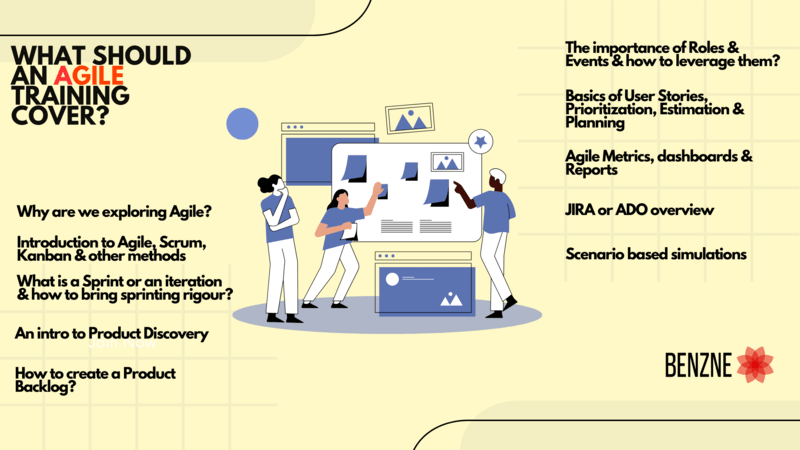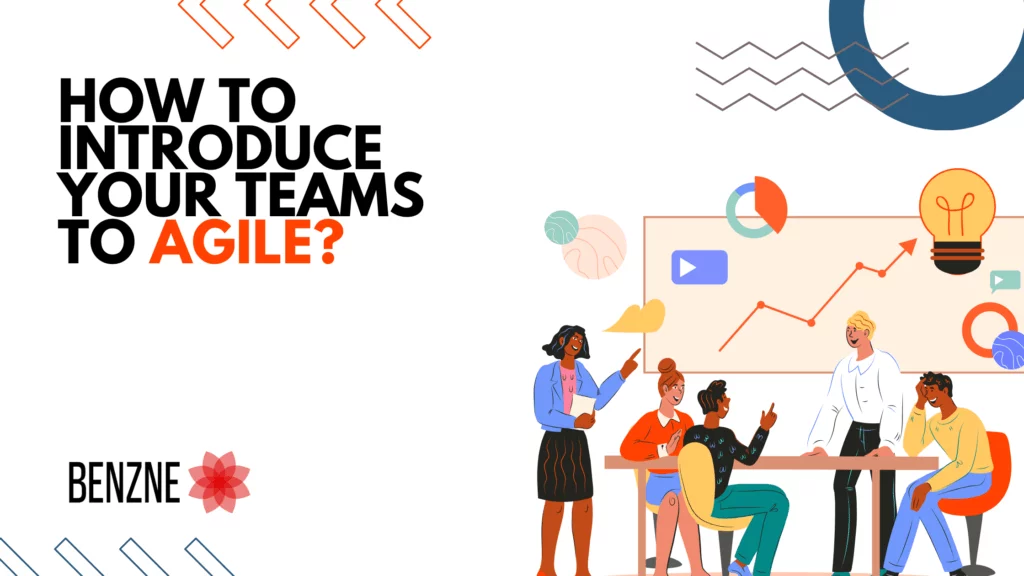Learning is NOT a ‘knowing‘ exercise only.
Often when Learning teams, CLOs, L&Ds are planning agile training sessions, they specifically stress on contextualisation and customisation of their learning programs. We have been part of so many discussions where ‘abstractness’ has been called out as something undesirable. It is not true. Abstractness gives people a framework/platform/introduction to think.
Maximum learning happens when people ‘try’ to solve their unique problem in their environment using the ‘abstract’. This contextualisation, which should be triggered by ‘awareness’ but translated by the individual, forms the basis of real skill enhancement.
Once you ‘know‘ the basic theory you need to ‘practice‘ & ‘experiment’ the concepts in your day to day environment and inspect and adapt to ‘learn’ the implementation.
Agile Training can only be a stepping stone in your Agile transformation journey. It is only when teams internalize the learning and start the implementation process that they will hit real world bottlenecks, search for solutions, discover insights and what works for them and slowly be on the path of realizing the benefits of agile ways of working.
Introductory Agile training sessions start with educating individuals or teams on why they should explore agile ways of working – what’s in it for them? Share real world success stories and then cover the principles, values, and practices of Agile methodology. Agile is an iterative and collaborative approach that emphasizes adaptability, flexibility, and customer satisfaction. Agile methodologies, such as Scrum, Kanban, and Lean, have gained popularity in various industries, including software development, product management and project management.
Agile training typically aims to provide participants with a solid understanding of Agile concepts and equip them with the skills necessary to start applying Agile principles in their work. The training can be delivered through various formats, such as workshops, seminars, online courses, or on-site training sessions. The content covered in Agile training often includes:
- Introduction to Agile
- Traditional Vs Agile Approach
- What is Agile and Why it is required in today’s world
- Incremental Iterative approach
- Agile Overview (Agile Manifesto and Principles)
- Forms of Agile (Scrum, Lean, Kanban and XP)
- Introduction to Scrum
- Origin and Characteristics of Scrum
- Scrum Terminologies
- How does an Agile – Scrum Project work
- Scrum Roles – Scrum Master, Product Owner, Scrum Team
- Scrum Ceremonies – Sprint Planning, Daily Scrum, Product backlog refinement, Sprint Review and Retrospective meetings
- Scrum Methodology – Sprint Execution
- Product Discovery – Visioning, User journey, Empathy mapping
- Story Map
- MVP slicing and Planning
- Product Timeline view
- Concepts on Sprint duration
- Sprint backlog and Product Backlog
- Product Backlog and User Stories
- User Story, Epic and Sub tasks
- Definition of Done – Discussion on participant’s actual DOD
- Definition of Ready
- 3C technique of User stories
- Backlog Prioritization
- Agile Estimation and Planning
- Planning Flow
- Scope , Cost and Time identification before kickstart
- Story point estimation and velocity
- Planning Poker
- Measuring project with velocity
- Agile Metrics and reports
- Burndown Charts, Velocity Chart , Release burndown chart, Cumulative flow diagram, Control Chart
- Introduction to Kanban
- What is Kanban?
- Kanban Sample workflow
- WIP Limits
- Lead time , Cycle time
- ALM Tool (JIRA or Azure Devops)
- Backlog Management
- Active Sprints
- Reports
- Ceremonies
- Scrum Simulation
- Backlog Derivation ( User stories and Acceptance criteria )
- Sprint planning
- DSM
- Demo / Sprint Review
- Retro
- Actual Project Based Discussion
- Real Case studies
- Real time problem solving
- Scenario based discussion
- Conclusion and QnA
The specific content and duration of Agile training can vary based on the actual requirement, training provider, the target audience, and the level of expertise desired. There can be some customization in the Agile training programs to align with specific industry or project requirements.
Optimize your software development lifecycle with agile software consulting. Our experts craft scalable solutions that meet modern demands and enhance collaborative efforts across teams.

Best agile training in India
There are several reputable Agile training providers in India (& across the globe) that offer high-quality Agile training programs. We are listing some of the reasons why you should explore Benzne Consulting as your Agile training partner in India below :
More than a training company: We pride ourselves as a pure play agile consulting company which also offers contextual Agile Trainings for our clients to initiate their agile journey. How is this beneficial to you? Our consultants are not academicians, all of them are hands-on agile practitioners who have seen multiple agile transformations at numerous clients, programs, teams. Their approach to a training workshop is dictated by their real world experience of implementing and bringing agility across multiple levels.
Course Content and Coverage: We are framework agnostic! Our training programs are designed and delivered keeping the ‘Agile Culture & mindset’ at its core. The idea is to kickstart your agile transformation journey against covering a prescribed content based on a particular certification.
Trainer Expertise: Evaluate the expertise and experience of the trainers employed by Benzne Consulting. Experienced trainers with real-world Agile project management experience can provide valuable insights and practical examples during the training sessions.
Customization and Flexibility: We keep specific organizational requirements in consideration when designing agile training programs, trainers routinely tweak course coverage during the session to accommodate context driven learning needs. They are able to do so because of multiple years of experience as an hands-on agile practitioner.
Reviews and Testimonials: We have consistently been ranked very highly with great feedback on our Agile training programs by our clients. Check our review on Clutch and Google to read more about what our customers have to say about our offerings. Our customers have ranked our program as the best agile training in India.
Support and Post-Training Path: As an agile consulting company, we don’t treat our Agile training interventions as a one-off training program. Our consultants regularly help our client teams in resolving their implementation issues and help them design their transformation journeys. Agile training is a stepping stone to a full fledged shift in ways of working, culture and mindset of the overall organization. We help our clients to not only implement agile at team level but scale to organizational agility.
Ultimately, the choice of an Agile training partner depends on your specific needs, preferences, and the fit between your requirements and what the training provider offers. It’s advisable to research multiple options, read reviews, and possibly reach out to the training providers directly to gather more information before making a decision.
Ultimately, you should also keep in mind that you select an Agile training company, which can not only design and facilitate a great learning session but also guide and, if needed, support your agile transformation journey. Experienced hands-on Agile practitioners will be able to go beyond the standard learning routine and initiate the know-do-be Agile journey of your teams, projects and programs. Getting the ‘Knowing Agile’ part right is extremely important as ‘unlearning’ is a far more tedious process than ‘learning. Wishing you all the best!
Reach to us consult@benzne.com if you want any support planning an Agile learning workshop for your teams with a focus on a successful agile transformation journey. Adapting to agile ways of working is mostly culture and mindset driven, aided by various frameworks, methodologies, tool and techniques.

